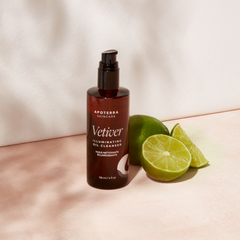Written by Hayley Wood and Dani Dauth; professionally reviewed by Dominique Caron.
The journey of life is marked by various phases, and so too is the journey of our skin. Today, we want to help dispel the misconception that fine lines and signs of aging in our skin are negative changes. In fact, the truth is quite the opposite – your 30s, 40s, and beyond can be the golden age of skin health, radiance, and self-confidence.
We interviewed Apoterra partner Dani Dauth of The Holistic Skin Studio of Biddeford, Maine to learn what she wishes everyone knew about fine lines, signs of aging, and optimal skincare in your 30s, 40s, and beyond.
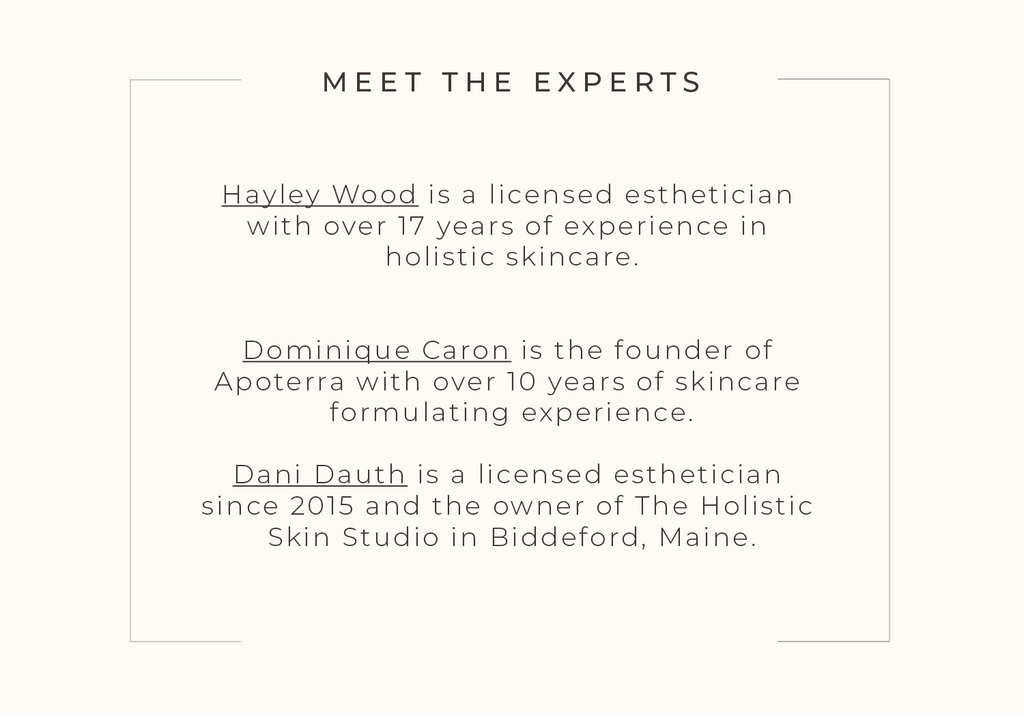
What Makes "Mature Skin"?
Let's start with addressing the terminology used to describe fine lines and signs of aging in skin. According to Dani, “35 is when skin is technically considered ‘mature.’ The term mature skin can have a negative connotation, but the reality is that you can have the healthiest skin of your life in your 30s and beyond”.
Describing someone's skin as "mature" at the age of 35 may not always accurately reflect the individual's skin condition. Whether or not a person's skin is considered mature can be considered somewhat subjective, and the rate of maturation depends on various factors, including genetics, lifestyle, skincare habits, and overall health. For example, fine lines can come with age, but they are typically a result of dehydration. Fine lines can appear on a 20 year old’s skin (without them being labeled “mature”) and just not be as prominent as those on someone in their late 30s.
It's important to remember that the appearance of signs of aging in the skin is a natural process, and it varies from person to person. Some people may experience noticeable changes like fine lines or wrinkles in their skin by their mid-30s, while others may not.
How can we keep skin healthy at any age?

So how can you know what to look for when taking care of your skin at any age? The focus should be on maintaining healthy skin through proper skincare and lifestyle choices rather than attaching labels based solely on age.
To navigate this exciting evolution of your skin, consider 4 key factors:
- Cell turnover
- Collagen and elastin production
- Shifting cleansing habits
- Mindset
Cell Turnover: The Essence of Youthful Glow
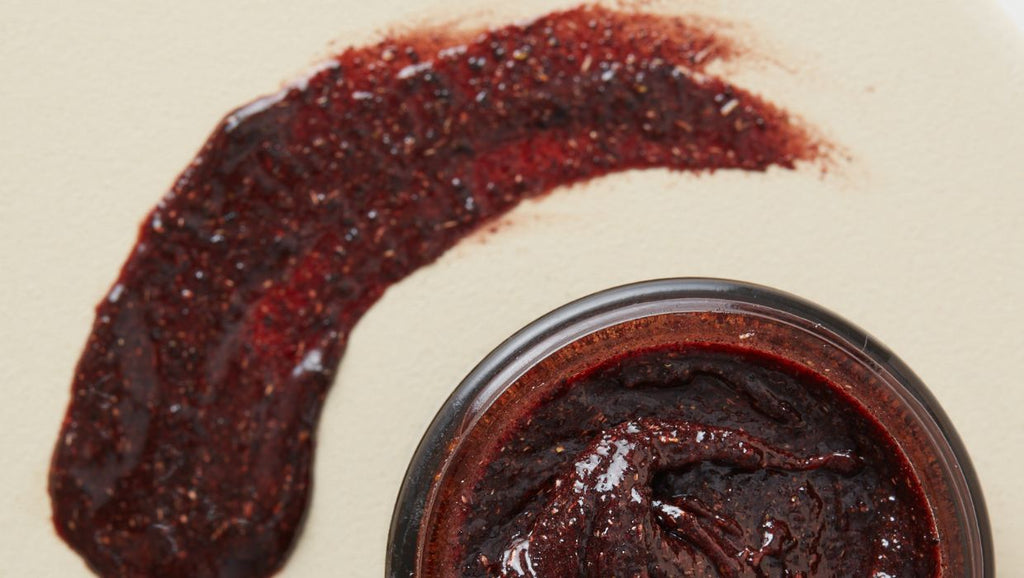
Did you know your skin is always in a cycle that helps support the production of new skin cells? Known as cell turnover, this cycle involves shedding dead and damaged cells to make way for new, vibrant ones. However, as we step into our 30s, this natural rhythm starts to slow down, leading to dullness and the emergence of fine lines.
“Cell turnover is the natural progression of your skin cell's life cycle. (Shedding dead skin cells to replace existing skin cells with younger healthy cells.) This process slows down as we hit our 30s. You may notice your skin looking dull and fine lines starting to make an appearance,” Dani describes.
The solution? Gentle exfoliation. Regular exfoliation not only sloughs away dead skin cells but also encourages the growth of new, fresh cells. Yet, remember, exfoliation is a delicate dance; opt for products that respect your skin's newfound sensitivity.
DANI'S TIP: “One way to counteract [the appearance of fine lines] is regular gentle exfoliation. Healthy hydration, a nutrient-dense diet high in antioxidants, and adequate sleep will also keep cell turnover healthy.”
But cell turnover doesn't solely rely on exfoliation; hydration, diet, and sleep are also important to cell turnover.
- Hydrated skin is resilient skin, capable of maintaining its suppleness and glow.
- A diet rich in antioxidants provides the palette for your cells to paint a vibrant canvas.
- And, of course, sleep – the rejuvenating slumber that allows your skin to repair and renew.
Collagen and Elastin: The Building Blocks of Timeless Beauty
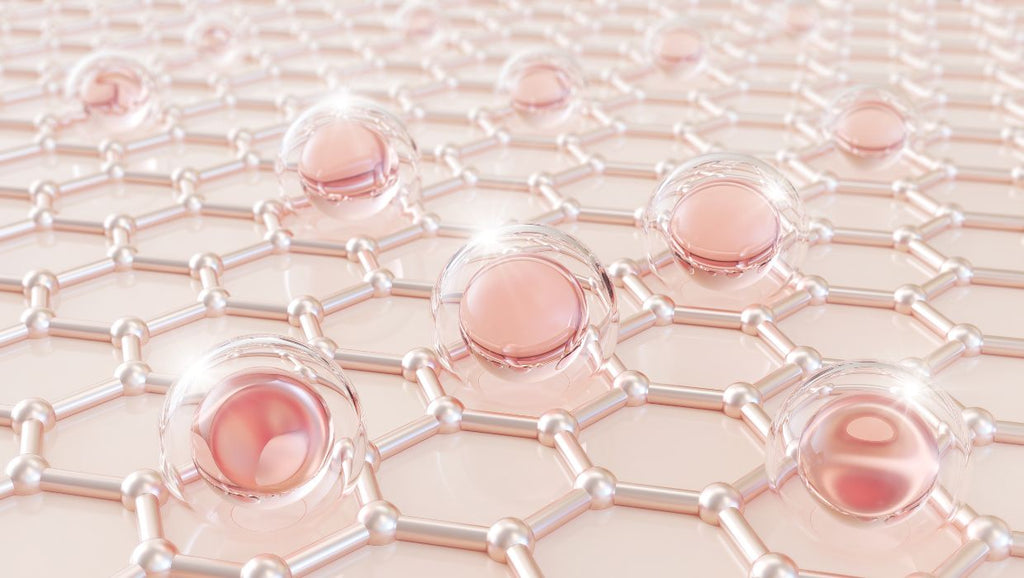
Imagine collagen and elastin as the scaffolding of your skin's architecture. Collagen, the primary protein responsible for maintaining skin's structure, keeps it plump and youthful.
According to Dani, “Collagen is the primary protein that maintains the structure of the skin. As we age, collagen production slows down, and in your 30s, you'll start to see the signs sneaking up in you.”
Thankfully, there's a secret ingredient in your skincare arsenal: Vitamin C.
This powerhouse nutrient not only provides a shield against damage with its antioxidant properties but also serves as a catalyst for collagen production. It's like giving your skin an artist's brush and telling it to paint a more youthful picture.
Dani continues, “Adding Vitamin C to your routine can help maintain healthy, glowing skin because it stimulates collagen production, improves skin texture, and combats damage with antioxidant properties.”
Incorporating Vitamin C into your routine can help maintain that coveted youthful texture and radiance. Learn more about Vitamin C in this blog and this blog.
The Shift to Gentle Cleansing: A Necessity in Your 30s and 40s
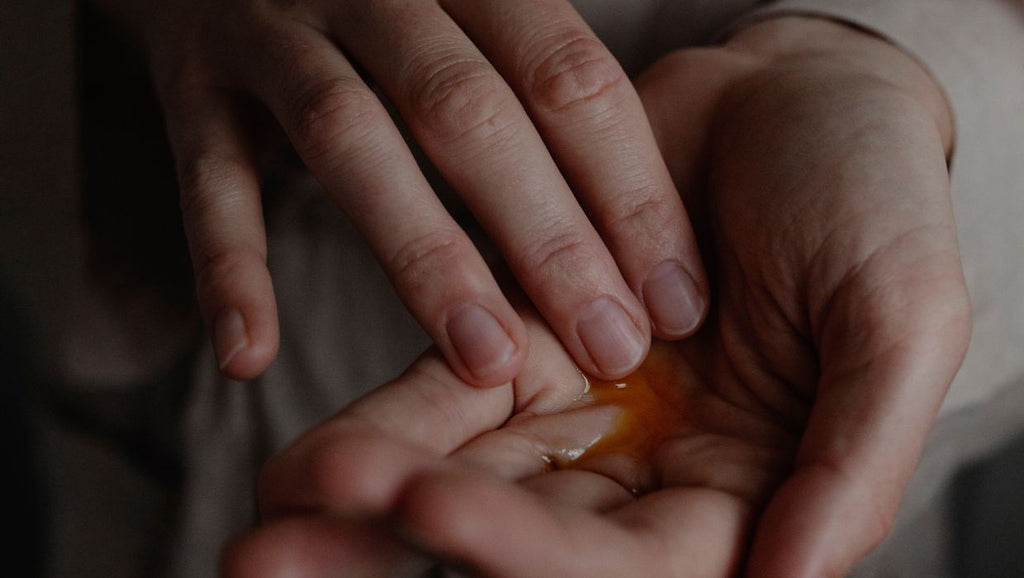
While transitioning into our 30s and 40s, one aspect of your skin routine—our skincare cleansing routine— should evolve towards a gentler approach compared to the more aggressive methods often employed in our teens and 20s. This shift is primarily recommended in order to respond to the changing needs of our skin over time.
In our youth, our skin is often more resilient and prone to excess oil production, making harsher cleansing methods seemingly effective. However, as we age, our skin naturally becomes thinner and more prone to dryness and possibly sensitivity.
Harsher cleansing techniques can strip away essential moisture, disrupt the skin's natural barrier, and potentially exacerbate issues like fine lines, redness, and age-related skin concerns.
DANI'S TIP:
My best advice for cleansing is that there shouldn’t be active Ingredients or foaming agents in your cleanser. The cleansing step is meant to remove dirt and oil from your skin only. Cleansers that contain actives tend to be too harsh on the skin, drying it out. Your skin shouldn’t feel tight and dry after cleansing. Foaming agents in cleansers are drying and can damage your skin's natural barrier. Aggressive soaps aren’t necessary to clean the skin, a gentle oil or cream cleanser will get the job done effectively without damaging the barrier or drying your skin.
A gentle approach in our 30s and 40s involves using mild, hydrating cleansers that preserve the skin's natural moisture balance, promote healthy aging, and protect against further damage, ultimately leading to a more radiant and youthful complexion. A great start would be to introduce the oil cleansing method.
Mindset: The True Elixir of Ageless Grace

Among the most significant changes that accompany aging is a shift in mindset.
DANI'S TIP:
Embracing the journey of growing older is an empowering act, one that deserves celebration. Aging is a privilege bestowed upon the canvas of life, each wrinkle and line a stroke of wisdom and experience. This shift from "anti-aging" to pro-aging involves embracing and loving yourself unconditionally, celebrating every milestone as a mark of grace. At Apoterra, we often favor the term "graceful aging" to describe celebrating this new phase of life while supporting the evolution of your skin with informed methods.
The cosmetics industry might have coined the term "anti-aging," but the reality is that aging is a natural, beautiful process. It's a biological symphony orchestrated by time, genetics, and life experiences. The focus should never be on fighting age but rather on nourishing and cherishing your skin. By approaching skincare with the intention of nurturing skin health, we reclaim the power from the negative undertones associated with aging.
Your 30s, 40s, and beyond mark a period of transformation, both for your skin and your mindset. Through mindful care, intelligent choices, and an empowering perspective, you can ensure that your skin radiates with health and confidence, reflecting the beauty of a life well-lived.




